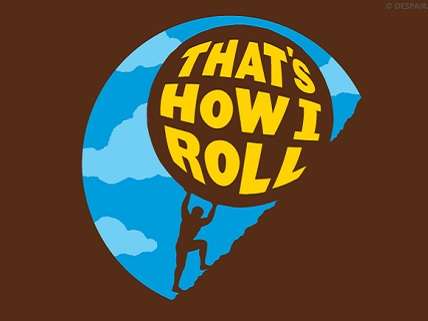Libertarian History/Philosophy
It's Time To Embrace Free-Market Existentialism!
Capitalism provides the most choices and opportunities for philosophical self-definition.

I am all alone, not in a despairing existentialist place, though sometimes I go there. No, I am all alone in the intersection of circles in a Venn diagram. The first circle represents the set of free-market philosophers and the second circle represents the set of existentialist philosophers. Free-market existentialism? The very idea, which is the subject of my new book, makes some people cringe.
A friend of mine was "horrified," as he put it, when I told him about what I had planned in connecting existentialism and capitalism. He warned me that any other self-identifying existentialist would be horrified as well. What he could not tell me was why.
By the "free market," I don't mean the crony capitalism or crapitalism one finds in the United States, but rather a libertarian economic system in which the government plays no role aside from providing rule of law and protecting property rights.
I define existentialism as a philosophy that reacts to an apparently absurd or meaningless world by urging the individual to overcome alienation, oppression, and despair through freedom and self-creation in order to become a genuine person. Existentialism is a philosophy of action, not of wallowing in despair. It is stoicism without quietism.
The main link between existentialism and libertarianism is individualism. In both systems of thought, the individual is primary and the individual is responsible. Granted, the sense of individualism characteristic of existentialism is not exactly the same as the sense of individualism characteristic of libertarianism, but they are not foreign to each other inasmuch as both strive for genuine autonomy.
Libertarians have long recognized the importance of strong property rights in securing autonomy, and existentialists have long recognized the importance of choosing meaning and subjective values for oneself in developing authenticity. One sense does not necessarily imply the other, but they do fit together well. Existentialists emphasize the importance of subjectively choosing one's values and making one's meaning, and libertarians champion the individual's prerogative to live in any way that does not cause harm to others.
Existentialism and libertarianism both value freedom and responsibility. As with individualism, the sense of freedom characteristic of existentialism is not exactly the same as the sense of freedom characteristic of libertarianism, but they are not foreign to each other. The entrepreneurs whom libertarians celebrate are risk takers and often rebels who feel a sense of exhilaration in taking chances. Existentialists, though, because of their largely negative view of capitalism, have typically ignored or dismissed such entrepreneurs as not-genuine examples of individuals exercising their freedom.
Nonetheless, the entrepreneurial spirit of working for yourself and not being beholden to others fits well with the existentialist ethic of self-reliance. There is a message of personal empowerment in existentialism and free markets, and existentialism can help us avoid the problem of consumerism.
By consumerism, I mean the addictive drive and desire for the newest and latest goods and services for the sake of deriving self-worth and for signaling one's worth to others. Existentialism calls for us to define ourselves as individuals and to resist being defined by external forces. The self-defining existentialist will find consumer culture crass without necessarily rejecting the free market that makes it possible.
One of the great concerns of the political left is that capitalism makes us into mindless drones who simply buy and consume. Of course capitalism provides circumstances that make it easier for a person to live that way, but capitalism can't make you do anything. It is possible to have capitalism without consumerism. Existentialism is actually the ideal balancing agent, the perfect accompaniment to capitalism, allowing us to reap the benefits of a free market while encouraging us to resist crass consumerism.
For the free-market existentialist, capitalism provides a large array of choices and opportunities conducive to self-definition. Dealing with consumer culture may be difficult, but it is just the kind of challenge the existentialist should relish for the opportunity to exercise responsibility and to grow through challenge.
Fear of capitalism and free markets is just fear that people can't be trusted to think and act for themselves. Capitalism allows us to vote freely in practically all consumer choices. Of course the temptation is to let our tastes and desires be shaped to a great extent by those around us, but there is nothing necessary about that. Indeed, the existentialist, who is keenly aware of and engaged in the task of self-definition will find that capitalism affords her a wide variety of choices that can aid, rather than hinder, her in self-definition.
We have come to "need" many things that in truth we only want. But at least some of these things, like automobiles, have real practical value, whereas other things, like the latest bedazzler sold on QVC, have virtually no real practical value. Most Americans could live with far less than they have, but that is not to say that they should. Prudentially, what they should do is examine their lives and define themselves. Consumer products are like alcohol. Everyone should have the right to them, but each of us needs to monitor our own consumption and be mindful of whether we are consuming or being consumed.
I still do not see why other existentialists are horrified by the free market, but I fear that I have drawn a target on my back rather than a Venn diagram in my mind. Perhaps if free-market existentialism is allowed to compete in the marketplace of ideas, I will have my answer and maybe even get some company.
This essay is excerpted from The Free-Market Existentialist with permission of Wiley.
Watch Nick Gillespie interview William Irwin for Reason TV. More details here.


Show Comments (42)